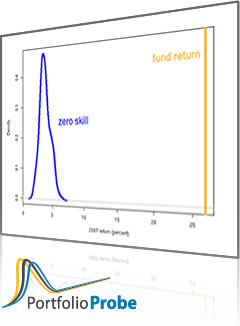Follow us using:
Newsletter Sign-up
Category Archives: R language
Implied alpha and minimum variance
Under the covers of strange bedfellows. Previously The idea of implied alpha was introduced in “Implied alpha — almost wordless”. In a comment to that post Jeff noticed that the optimal portfolio given for the example is ever so close to the minimum variance portfolio. That is because there is a problem with the example … Continue reading
Posted in Quant finance, R language
Tagged implied alpha, minimum variance portfolio, reverse optimization
7 Comments
Variance matrix differences
Torturing portfolios to give different volatilities between a factor model and Ledoit-Wolf shrinkage. Previously There have been posts on: “What the hell is a variance matrix?” factor models Ledoit-Wolf shrinkage Question Two of the several ways to produce an estimate of the variance matrix of asset returns is a statistical factor model and Ledoit-Wolf shrinkage. … Continue reading
The half variance approximation for mean returns
What’s that thing about arithmetic and geometric returns and the variance? Previously An introduction to the difference between simple and log returns is: A tale of two returns Issue Suppose you are predicting the mean annual return of an asset for some number of years. To simplify the discussion, let’s buy into the fantasy that … Continue reading
Slouching towards simulating investment skill
When investment skill is simulated, it is often presented as if it is obvious how to do it. Maybe I’m wrong, but I don’t think it’s obvious. Previously In “Simple tests of predicted returns” we saw that prediction quality need not look like what you would find in a textbook. For example, there was a … Continue reading
garch and the distribution of returns
Using garch to learn a little about the distribution of returns. Previously There are posts on garch — in particular: A practical introduction to garch modeling The components garch model in the rugarch package garch and long tails There has also been discussion of the distribution of returns, including a satire called “The distribution of … Continue reading
Stock-picking opportunity and the ratio of variabilities
How good is the current opportunity to pick stocks relative to the past? Idea The more stocks act differently from each other relative to how volatile they are, the more opportunity there is to benefit by selecting stocks. This post looks at a particular way of investigating that idea. Data Daily (log) returns of 442 … Continue reading
Posted in Quant finance, R language
Tagged opportunity ratio, S&P 500, stock-picking opportunity, volatility
6 Comments
A pictorial history of US large cap correlation
How has the distribution of correlations changed over the last several years? Previously Posts about correlation boxplots explained Data Daily returns of 443 large cap US stocks from 2004 through 2012 were used. The sample correlations — almost 98,000 of them — during each year were created. If we were actually using the correlations, then … Continue reading
Variability of garch predictions
How variable are garch predictions? Previously There have been several posts on garch, in particular: A practical introduction to garch modeling The components garch model in the rugarch package Both of these posts speak about the two common prediction targets: prediction (of volatility) at the individual times (usually days) term structure prediction — the average … Continue reading
Upcoming events
Highlighted LondonR is soon — see the “Previously Announced” section. New Events Thirsty Quants 2013 March 21, London. Some thirsty quants will be going for a drink on the 21st of March as of 18.30 at the Lamb Tavern in Leadenhall Market. http://www.lambtavernleadenhall.com/ Rethinking the Economics of Pensions 2013 March 21 & 22 in London. … Continue reading
Posted in Events, R language
Leave a comment
Predicted correlations and portfolio optimization
What effect do predicted correlations have when optimizing trades? Background A concern about optimization that is not one of “The top 7 portfolio optimization problems” is that correlations spike during a crisis which is when you most want optimization to work. This post looks at a small piece of that question. It wonders if increasing predicted … Continue reading
